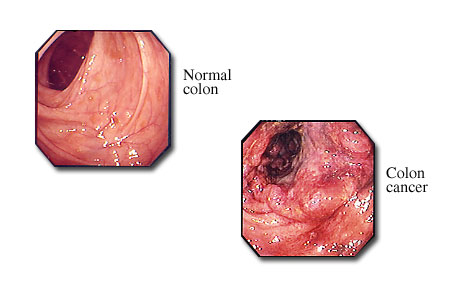What is colon cancer?
Colon cancer happens when cells that are not normal grow in your colon. These cells often form in polyps, which are small growths in the colon. Not all colon polyps turn into cancer. But most colon cancer starts in a polyp.
Colon cancer occurs most often in people older than 50.
What are the symptoms of colon cancer?
Colon cancer in its early stages usually doesn't cause any symptoms. Symptoms occur later, when the cancer may be harder to treat. The most common symptoms include:
- Blood in your stool or very dark stools.
- A change in your bowel habits, such as more frequent stools or a feeling that your bowels are not emptying completely.
- Pain in the belly or rectal pain.
- Low energy.
Cancer in the Colon

Photo credit: Jacqueline Littée, RN. All rights reserved.
Signs of cancer may be found in the colon during a colonoscopy or sigmoidoscopy.
How is colon cancer treated?
Treatment for colon cancer is based on the stage and location of the cancer. It's also based on other things, such as your overall health. Most people have surgery to remove the cancer. Chemotherapy, radiation therapy, or both may also be used. In some cases, targeted therapy or immunotherapy may be an option.
How can you care for yourself when you have colon cancer?
- Take your medicines exactly as prescribed. Call your doctor if you think you are having a problem with your medicine.
- Follow your doctor's instructions to relieve pain. Pain from cancer and surgery can almost always be controlled. Use pain medicine when you first notice pain, before it becomes severe.
- Eat healthy food. If you do not feel like eating, try to eat food that has protein and extra calories to keep up your strength and prevent weight loss. Drink liquid meal replacements for extra calories and protein. Try to eat your main meal early.
- Get some physical activity every day, but do not get too tired.
- Take steps to manage your stress, such as learning relaxation techniques. To also help reduce stress, get enough sleep, eat a healthy diet, and take time to do things you enjoy.
- Think about joining a support group. Or discuss your concerns with your doctor or a counselor.
- If you are vomiting or have diarrhea:
- Drink plenty of fluids to prevent dehydration. Choose water and other clear liquids. If you have kidney, heart, or liver disease and have to limit fluids, talk with your doctor before you increase the amount of fluids you drink.
- When you are able to eat, try clear soups, mild foods, and liquids until all symptoms are gone for 12 to 48 hours. Other good choices include dry toast, crackers, cooked cereal, and gelatin dessert, such as Jell-O.
- If you have not already done so, prepare a list of advance directives. Advance directives are instructions to your doctor and family members about what kind of care you want if you become unable to speak or express yourself.
Colon cancer: When to call
Call 911 anytime you think you may need emergency care. For example, call if:
- You pass maroon or very bloody stools.
- You passed out (lost consciousness).
Call your doctor now or seek immediate medical care if:
- You have a fever.
- You are vomiting.
- You have new or worse belly pain.
- You cannot pass stools or gas.
- You have new or more blood in your stool.
Watch closely for changes in your health, and be sure to contact your doctor if:
- You are losing weight.
- You have new or worse symptoms.
- You do not get better as expected.
©2011-2025 Healthwise, Incorporated
